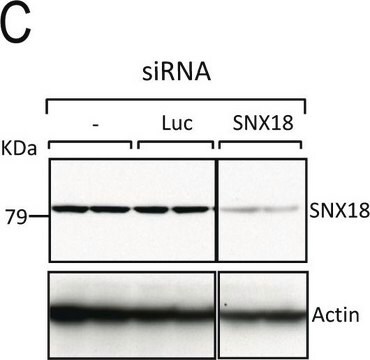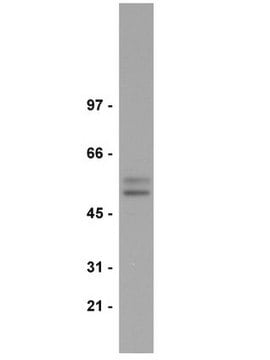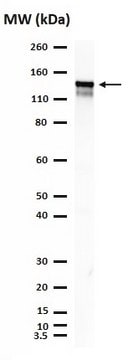M7683
Anti-phospho-MAP Kinase Kinase 1/2 (pSer217/221) antibody produced in rabbit
affinity isolated antibody, buffered aqueous glycerol solution
Synonym(s):
Anti-phospho-MEK 1/2 (pSer217/221)
About This Item
Recommended Products
biological source
rabbit
Quality Level
conjugate
unconjugated
antibody form
affinity isolated antibody
antibody product type
primary antibodies
clone
polyclonal
form
buffered aqueous glycerol solution
mol wt
antigen 45 kDa
species reactivity
human, rat, mouse
technique(s)
flow cytometry: 1:50 using PMA treated human peripheral blood lymphocytes and Jurkat cells.
immunocytochemistry: 1:1,000 using HeLa cells
immunohistochemistry (formalin-fixed, paraffin-embedded sections): 1:100 using tissue sections from human breast carcinoma
immunoprecipitation (IP): 1:50
western blot: 1:1,000 using serum-treated NIH-3T3 cells
UniProt accession no.
shipped in
wet ice
storage temp.
−20°C
target post-translational modification
phosphorylation (pSer217/pSer221)
Gene Information
human ... MAPK1(5594)
mouse ... Mapk1(26413)
rat ... Mapk1(116590)
Related Categories
General description
The antibody specifically recognizes MEK1/2 (45 kDa) only when phosphorylated at Ser217 and Ser221. It reacts strongly with MEK1/2 phosphorylated only at Ser217, but less when phosphorylated only at Ser221. It shows not cross reaction with any other related family members including SEK.
Specificity
Immunogen
Application
Physical form
Disclaimer
Not finding the right product?
Try our Product Selector Tool.
Storage Class Code
10 - Combustible liquids
Flash Point(F)
Not applicable
Flash Point(C)
Not applicable
Certificates of Analysis (COA)
Search for Certificates of Analysis (COA) by entering the products Lot/Batch Number. Lot and Batch Numbers can be found on a product’s label following the words ‘Lot’ or ‘Batch’.
Already Own This Product?
Find documentation for the products that you have recently purchased in the Document Library.
Our team of scientists has experience in all areas of research including Life Science, Material Science, Chemical Synthesis, Chromatography, Analytical and many others.
Contact Technical Service








